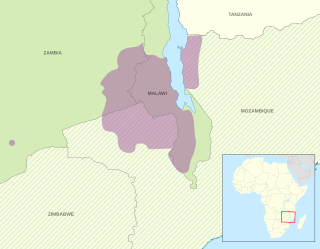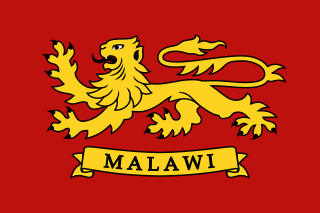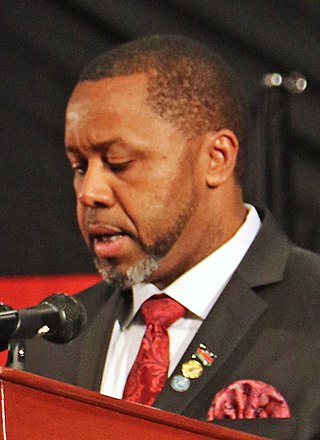
The kwacha is the currency of Malawi as of 1971, replacing the Malawian pound. It is divided into 100 tambala. The kwacha replaced other types of currency, namely the British pound sterling, the South African rand, and the Rhodesian dollar, that had previously circulated through the Malawian economy. The exchange rate of the kwacha undergoes fixed periodical adjustments, but since 1994 the exchange rate has floated. In 2005, administrative measures were put in place by Bingu wa Mutharika to peg the exchange rate with other currencies. Banknotes are issued by the Reserve Bank of Malawi. In May 2012, the Reserve Bank of Malawi devalued the kwacha by 34% and unpegged it from the United States dollar.
Music of Malawi has historically been influenced through its triple cultural heritage of British, African, and American music. Malawians have long been travelers and migrant workers, and as a result, their music has spread across the African continent and blended with other music forms. One of the prime historical causes of the Malawian musical melting pot was World War II, when soldiers both brought music to distant lands and also brought them back. By the end of the war, guitar and banjo duos were the most popular type of dance bands. Both instruments were imported. Malawians working in the mines in South Africa and Mozambique also led to fusion and blending in music styles, giving rise to music styles like Kwela.

Chewa is a Bantu language spoken in Malawi and a recognised minority in Zambia and Mozambique. The noun class prefix chi- is used for languages, so the language is usually called Chichewa and Chinyanja. In Malawi, the name was officially changed from Chinyanja to Chichewa in 1968 at the insistence of President Hastings Kamuzu Banda, and this is still the name most commonly used in Malawi today. In Zambia, the language is generally known as Nyanja or Cinyanja/Chinyanja '(language) of the lake'.

The president of the Republic of Malawi is the head of state and head of government of Malawi. The president leads the executive branch of the Government of Malawi and is the commander-in-chief of the Malawian Defence Force.
The Tumbuka language is a Bantu language which is spoken in Malawi, Zambia, and Tanzania. It is also known by the autonym Chitumbuka also spelled Citumbuka — the chi- prefix in front of Tumbuka means "in the manner of", and is understood in this case to mean "the language of the Tumbuka people". Tumbuka belongs to the same language group as Chewa and Sena.
Malawian English is the English language as spoken in Malawi. English is the country's official language.

The Chewa are a Bantu ethnic group found in Malawi, Zambia and few in Mozambique. The Chewa are closely related to people in surrounding regions such as the Tumbuka and Nsenga. They are historically also related to the Bemba, with whom they share a similar origin in the Democratic Republic of the Congo. As with the Nsenga and Tumbuka, a small part of Chewa territory came under the influence of the Ngoni, who were of Zulu or Natal/Transvaal origin. An alternative name, often used interchangeably with Chewa, is Nyanja. Their language is called Chichewa. Internationally, the Chewa are mainly known for their masks and their secret societies, called Nyau, as well as their agricultural techniques.
Jack Mapanje is a Malawian writer and poet. He was the head of English at the Chancellor College, the main campus of the University of Malawi before being imprisoned in 1987 for his collection Of Chameleons and Gods, which indirectly criticized the administration of President Hastings Banda. He was released in 1991 and emigrated to the UK, where he worked as a teacher.

The Very Best is a collaboration between London-based DJ and production duo Radioclit and Esau Mwamwaya, a singer from Lilongwe, Malawi. Their music has been described as an Afro-Western mix of dance, hip hop, pop, and the traditional music of Malawi.

Vice-President of Malawi is the second highest political position in Malawi.

Nali Sauce is a popular sauce from Malawi dubbed, "'Africa's hottest peri-peri sauce'. It is one of Malawi's most popular sauces. The Nali sauce brands have attained cult status with chilli lovers both in Malawi and throughout the world for their hotness and taste. The heat level of Nali sauce is approximately Piri piri 175.000 scoville heat units
Francis Kaphuka or Young Kay is a popular Malawian hip-hop artist that is known for fusing local Malawian folk songs with international genres. He is known for his vibrant sound and ability to mix Chichewa and English lyrics eloquently in his rhymes. This has earned him recognition as one of Malawi's best lyricists. He has been voted as Malawi’s best rapper twice Joy FM fans and in 2021 was crowned King of Malawian Hiphop by the audience of one of Malawi's biggest online platforms, Mikozi Networks. He was introduced to Malawian audiences under Rush records with the single “I’m Home” and his popularity grew to solidify his place as one of Malawi's greatest hip-hop artists. He has had subsequent hits since then. His song “zipepese” number 2 on FM 101 Power’s urban music chart. In 2010 he collaborated with Malawian born rising act Onesimus Muzik on a track titled "Beautiful" He also collaborated with Lucius Banda, Tigris, and Maskal on track "Malawi Goodlife" in 2011.
Zodiak Broadcasting Station is a privately owned radio station in Malawi. It was founded in 2005 by Gospel Kazako. The station has more than 25 transmitting sites and reaches the whole of Malawi. Nearly 75% of its programmes are broadcast in Chichewa, Malawi's main language. One of its most popular shows is its Chichewa talk show 'Tiuzeni Zoona'.
Ezra Jofiya Chadza (1923-1985) or E.J. Chadza, as he signed his books, was a well-known Malawian teacher, author and poet, writing especially in the Chichewa language of Malawi.
Benedicto Wokomaatani Malunga, also known as Ben Malunga, is a Malawian poet, writing in the Chichewa language. He is also a short-story writer, an essayist, a music composer, public speaker, and translator who has translated Chinua Achebe's Things Fall Apart into Chichewa under the title Chipasupasu. Malunga holds a bachelor's degree from Chancellor College of the University of Malawi (1986) and an MA from Manchester University (1996) in the UK. He is currently working as Registrar for the University of Malawi and Secretary of the University of Malawi Council.

Professor Francis P. B. Moto is a Malawian writer, academic, and diplomat. His home is Golomoti in the Dedza District of Malawi. He attended secondary school in Chichiri in Blantyre and was admitted to the University of Malawi in 1972, obtaining a degree in linguistics in 1977.
Harri Englund is Professor of Social Anthropology at the University of Cambridge, Fellow of the British Academy and of Churchill College, Cambridge. Englund studied anthropology at the University of Helsinki and the University of Manchester. After holding academic posts in the United Kingdom, Sweden and Finland, Englund moved to the University of Cambridge in 2004. He was promoted to professorship in 2014 and elected a Fellow of the British Academy in 2019. Englund's field research has taken place in Malawi, Mozambique, Zambia and Finland. His publications have addressed topics such as human rights, humanitarianism, and moral and political thought in the Chichewa language. He has also studied the racial and humanitarian politics of Christian missions in 19th-century Malawi. In 2006, the Royal Anthropological Institute awarded the Amaury Talbot Prize to his book Prisoners of Freedom: Human Rights and the African Poor.
Alfred (“Al”) D. Mtenje is a professor of Linguistics at the University of Malawi. He is known for his work on the prosody of Malawian Bantu languages, as well as for his work in support of language policies promoting the native languages of Malawi.







